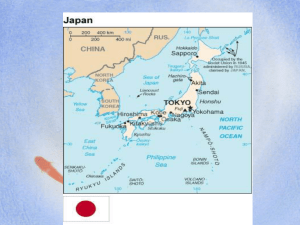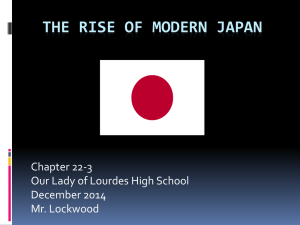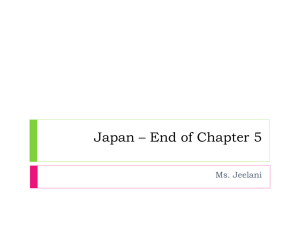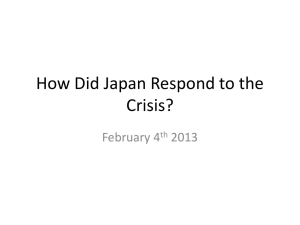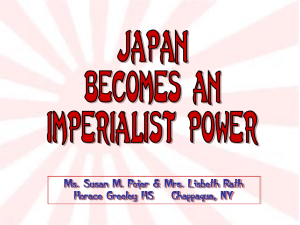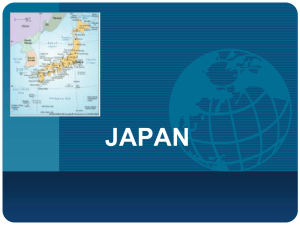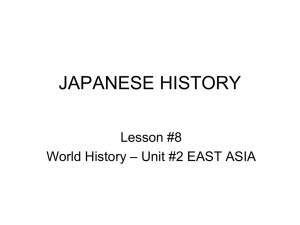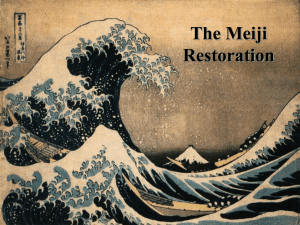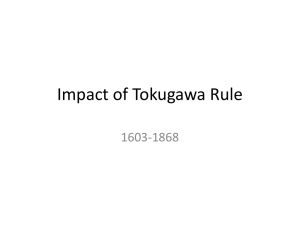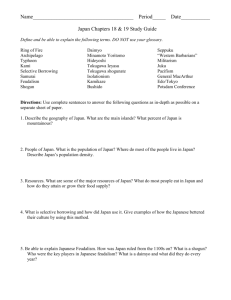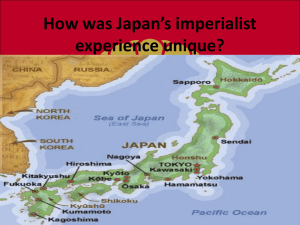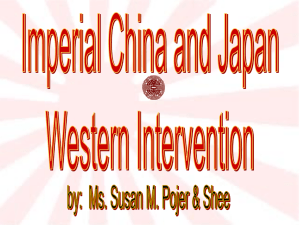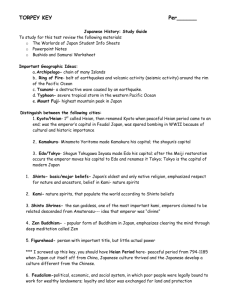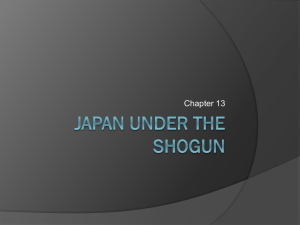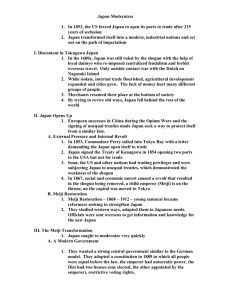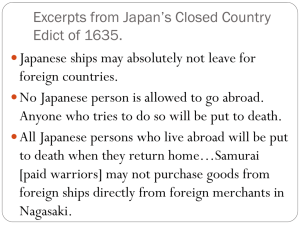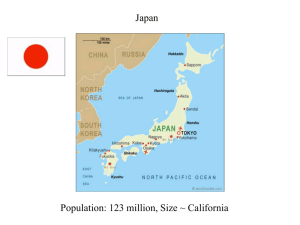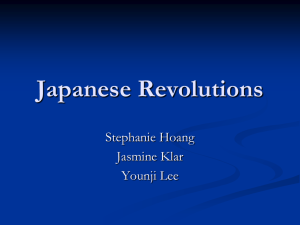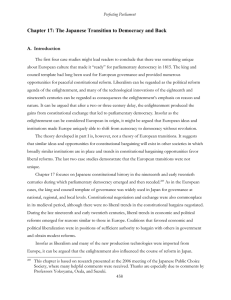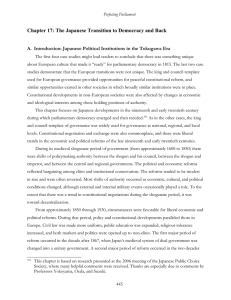Practice Unit Test
advertisement
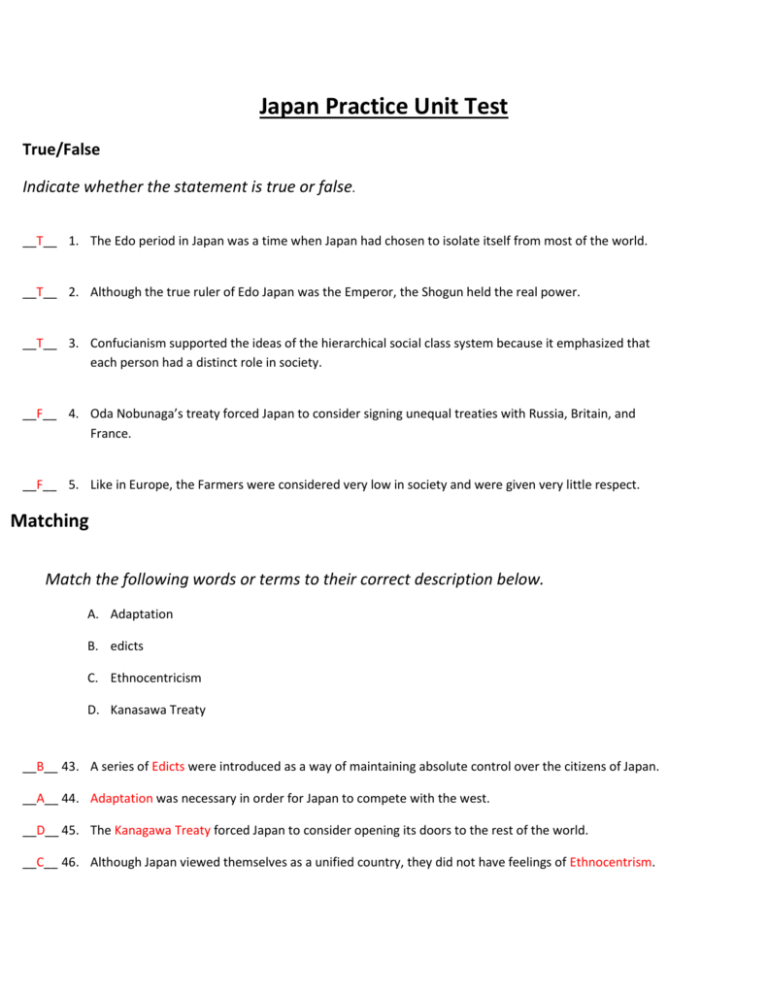
Japan Practice Unit Test True/False Indicate whether the statement is true or false. __T__ 1. The Edo period in Japan was a time when Japan had chosen to isolate itself from most of the world. __T__ 2. Although the true ruler of Edo Japan was the Emperor, the Shogun held the real power. __T__ 3. Confucianism supported the ideas of the hierarchical social class system because it emphasized that each person had a distinct role in society. __F__ 4. Oda Nobunaga’s treaty forced Japan to consider signing unequal treaties with Russia, Britain, and France. __F__ 5. Like in Europe, the Farmers were considered very low in society and were given very little respect. Matching Match the following words or terms to their correct description below. A. Adaptation B. edicts C. Ethnocentricism D. Kanasawa Treaty __B__ 43. A series of Edicts were introduced as a way of maintaining absolute control over the citizens of Japan. __A__ 44. Adaptation was necessary in order for Japan to compete with the west. __D__ 45. The Kanagawa Treaty forced Japan to consider opening its doors to the rest of the world. __C__ 46. Although Japan viewed themselves as a unified country, they did not have feelings of Ethnocentrism. Match the following words or terms to their correct description below. A. Iwakura Mission B. Feudalisim C. Modernization D. Closed Country Edict __A__ 47. The Iwakura Missionhelped Japan model many of its social systems after countries from the west. __D__ 48. Tokugawa used the Closed Country Edict to create one unified, homogeneous culture. __C__ 49. After opening its doors to the west Japan went through a rapid period of Modernization. Define the following Worldview – The overall perspective from which one sees and interprets the world. Tsunami – A strong, destructive wave caused by an earthquake or volcanic eruption on the ocean floor. Arable – Land suitable for farming and agriculture. Homogenous – A group of people similar in nature and colour. Assimilation – Forcing a group of people to acquire the characteristics of a majority group. Alternate Attendance – A policy that required each daimyo to spend one year in Edo and the next in their home. While not in Edo the daimyos were forced to leave their family their as a ‘guest’ of the Shogun. Hereditary – Determined by birth. Meiji – Japanese word meaning enlightened rule. Oligarchy – An unelected group of powerful leaders. Westernization – Adopting the culture and ideas of the Western world. Backlash – Adverse or hostile reaction against change. Imperialism – The extension of power over a territory including its resources and people. Indemnity – Payment for losses. Answer the following in complete sentences: 1. How did the war between Russia and Japan end? The war between Russia and Japan ended with the signing of a peace treaty. Russia was forced to abandon its war efforts because of a revolution in their country. 2. What was the Merchants role in society? The merchants’ role in society was to buy items from artisans to trade or sell to others. They also shipped, distributed, and stored food. 3. What is seppuku? Describe the ritual. Seppuku was a ritualistic suicide practiced by the Japanese people. If someone behaved dishonourably they were required to take their own life. Seppuku involved one person disemboweling themselves, while another stood by to decapitate that individual. 4. What was the purpose of the Exclusion Laws? The Exclusion Laws were created mainly to keep missionaries out of the country that tried to sneak in disguised as traders. 5. Why did the Shogun of Japan give in to Matthew Perry’s demands? The shogun of Japan gave into Matthew Perry’s demands because he was told that he would either comply or go to war with America. The shogun knew that he would lose a war with America so he had no choice but to give in. 6. What were the two goals of the oligarchy at the beginning of the Meiji period? The two goals of the oligarchy were to create a strong centralized government, and to model their government from that of a Western power. 7. What were some of the changes made in Japan during the period of Westernization? Some changes during Westernization were: some Japanese customs were outlawed, western-style behavior was adopted, and western-style clothing was worn. 8. What were the three things that Japan thought a strong nation should have? (they saw these traits in the strong countries of the west) The Japanese thought a strong nation should have control over foreign colonies, strong military power, and a strong and independent economy. 9. Why is the story of the 47 Ronin still celebrated as a national holiday? The story of the 47 Ronin is still celebrated as a national holiday because it embodies the strong focus of honour in the Japanese culture. These ronin were considered heroes for regaining honour after their master was forced to commit seppuku. 10. Who was Will Adams and what did he do to change Japan? Will Adams was an Englishmen that came to Japan in 1600. He later became an advisor to the shogun and shared stories about the spread of Christianity, and how the Catholic Church persecuted those who opposed them. This led to the Exclusion Laws. 11. In what ways did Japan isolate itself from the rest of the world? Japan isolated itself by forbidding any foreigners from entering Japan, as well as forbidding their own people from leaving Japan. 12. How did the Emperor hold his power over the people? The Emperor held his power over the people because they believed him to be the descendant of Amaterasu, the goddess of the sun. 13. What did Tokugawa Ieyasu do to ensure that he held onto his power? Tokugawa Ieyasu held his power by keeping control of the daimyos through a series of strict laws. Two of his main policies was ‘Alternate Attendance’ and ‘Sharing Power’. 14. What was expected of a Samurai warrior? A Samurai was expected to be brave when faced with pain or death and to be prepared to die fearlessly in battle. 15. What new kind of belief came to Japan? How did this threaten the emperor’s power? Christianity came to Japan with the Westerners; this new belief system threatened the emperor’s power because it believed in one God and one Son. The Emperor held his power through the belief that he was a living god. 16. What sorts of new technology did Matthew Perry bring to Japan as a gift? Matthew Perry brought a miniature steam engine, and telegraph sets with batteries and wires as gifts to impress the Emperor of Japan. 17. What was the motto at the beginning of the Meiji period and what did it mean? The motto at the beginning of the Meiji period was ‘Western science, Japanese essence’. This meant that the Japanese would adopt the technology and sciences of the Western countries, but still keep their own culture and beliefs.

